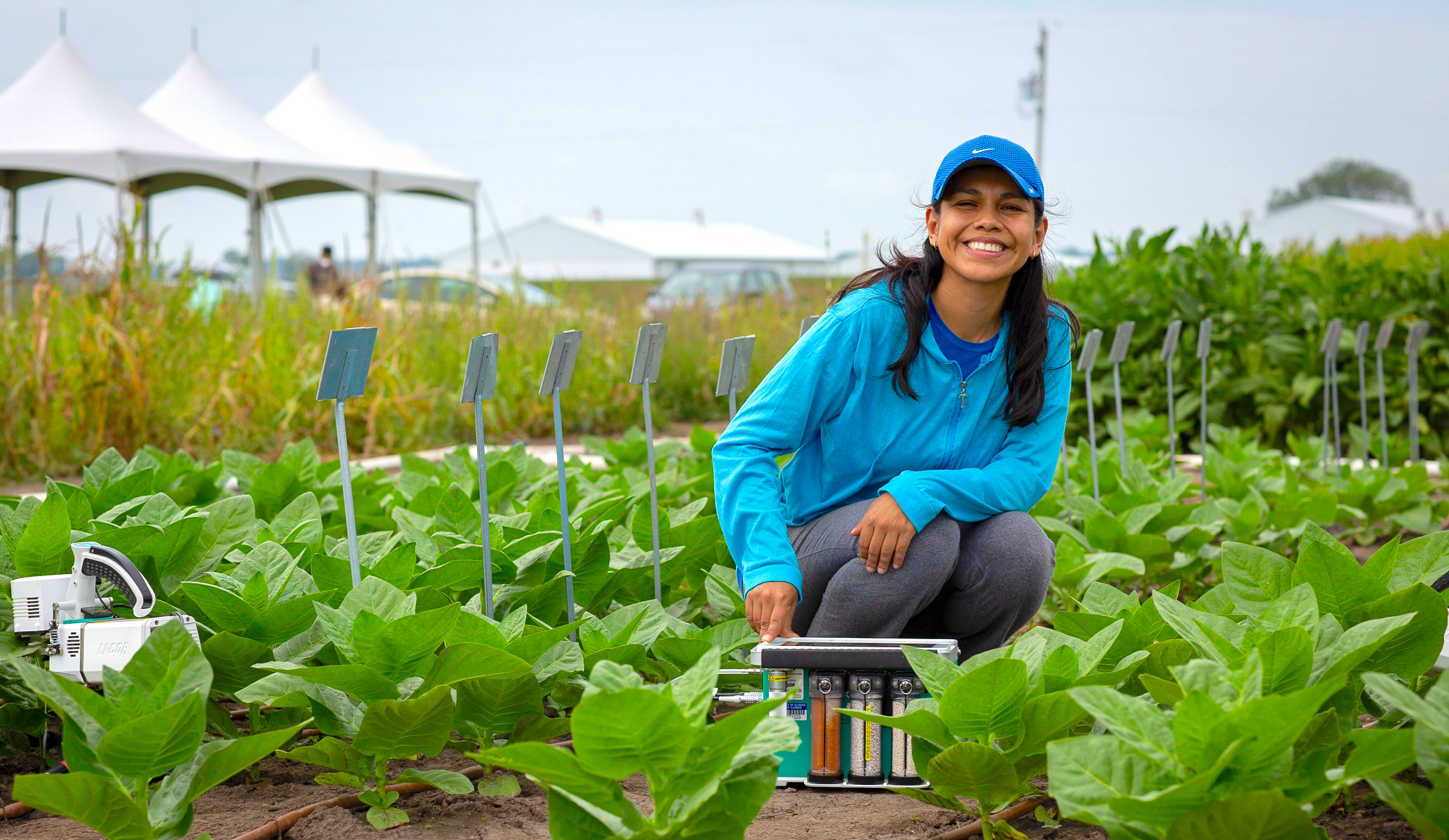RIPE Spotlight: Ursula Ruiz-Vera

What makes RIPE the project what it is today is attributable to our team members who dedicate their hard work and efforts to our mission—feeding the world in the face of climate change and a growing population. This postdoctoral feature series focuses on sharing the new endeavors of our researchers as they move on to the next chapter in their lives.
Ursula Ruiz-Vera was a postdoctoral researcher at the University of Illinois. Her research focused on the physiological responses of plants to different environmental conditions. For the RIPE project, Ursula worked on understanding the sink limitation and light interception efficiency of crops like soybean, tobacco, and cassava. Read more about Ursula here.
This interview was conducted in December of 2021.
Where is your new opportunity, what is your title, and what will you be doing?
Starting in January of 2022, I will be working at Bayer as a Senior Scientist, Control Environment Plant Physiologist. There I will be applying my expertise in crop physiology time in a greenhouse setting.
I was interested in industry jobs last year, and it was a great time to focus on this area. I like the new research in innovative areas that industries are doing that are related to more sustainable agriculture. Companies are starting to work more on carbon capture and trying to mitigate the carbon footprint, plus increasing productivity in crops. These topics are interesting to me, and Bayer is one of the companies I have been looking to work at for a long time.
I was part of I-Corps at Illinois, which teaches university faculty and student entrepreneurs to identify valuable product opportunities that can emerge from academic research, and provides entrepreneurship training, which helped me learn more about how it is to work in industry.
How have your experiences at RIPE helped you prepare for this?
I tried to take advantage of the most aspects of research and have a successful research project. I was focused on having results and obtaining the goals of my project. I tried to learn other skills related to leadership and management of teams because I wanted to be better at those topics. RIPE allowed me to do that because they train you for that, and you have the availability to hire people if you need it, and you can also learn with them better strategies for training team members. RIPE even gives us training for leadership and communication workshops.
If you have a goal and want to use those skills, you should take advantage of those workshops. Another important thing was the opportunity of collaboration in RIPE, which is important for jobs in the industry because the work you will do will involve team efforts.
What is one of your favorite RIPE memories?
I really enjoyed the meetings that RIPE would hold, but the one memory that I remember the most was the one in Australia for the RIPE Annual Meeting. Crossing the ocean and going to a different country was exciting and new for me. I was experiencing a whole new country and different plants and animals and what other researchers do may vary compared to what I was used to at Illinois. I learned about other cultures, and it was an enriching experience. We also made a small trip to the zoo. Overall, it was the longest flight I’ve ever been on, maybe about 14 hours.
Another one of my favorite RIPE memories is when I finished the first year of my cassava experiment. The last day was very rewarding. We were all tired after digging up many roots by hand for many days, and it was very humid. The excavator couldn’t help us, but other people were helping us, and we finished very late that last day around 7-8PM. Everyone was happy and it was fun. We couldn’t believe that.
What advice do you have for current RIPE postdocs?
The most important thing for me was to understand what my motivations are and where I want to go so I can focus more on how I can make my work apply to that goal. What motivates me is to teach and do research. I truly know I want to be a professor, so I started thinking of what I needed to do to do that. In my case, I am interested in innovation and research, and I know not that much about teaching, so I started discovering more—over time—that I wanted to be part of the industry.
Anything else you would like to add?
Don’t give up because I was looking for jobs for many years. Some people find jobs really fast and others don’t, but just keep applying. If you keep doing it, it has to happen at some point, but it can take many years and you may not be motivated and your interests can change. It’s important to not give up.
As told to: Amanda Nguyen || RIPE Communications Specialist
